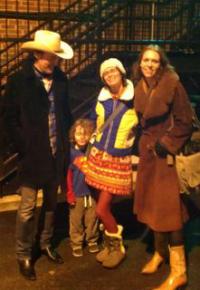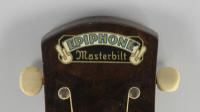Forums » Gillian Welch and David Rawlings "Lyrics"
Influences and references
-
This could probably be a whole forum category unto itself. I am hoping for a discussion exploring some of the lyrical references (and musical ones, as well), in Gillian and David's work. In the article I was trying to post to "Articles" earlier (http://bombsite.com/issues/109/articles/3331), Lydia and Gillian talk about how popular music (at least until recently) is sufficiently universal that lyrical references are effective in a way that literary references, for instance, aren't (at least anymore).
They use the example of "Camptown Races," which, of course, shows up quite obviously on The Harrow and The Harvest in "Hard Times" (The Camptown Man). Also in this article, they talk about the work of roots blues musician Dock Boggs, whose work is featured in Harry Smith's "Anthology of American Music." One of his best known songs is a piece called "Country Blues"(or "Hustling Gamblers"). The version of that song that I have on "Country Blues: Complete Early Recordings) was a 78 containing the lyrics:
"Give me corn bread when I'm hungry, good people;
Corn whiskey when I'm dry;
Pretty women a-standing around me;
Sweet heaven when I die."-Clearly referenced in "Tennessee"
There are also these opening verses:
"Come all you good time people,
While I've got money to spend,
Tomorrow might be Monday
And I'll neither have a dollar nor a friend.When I had plenty of money, good people,
My friends were all standing around,
Just as soon as my pocket book was empty,
Not a friend on earth to be found."-Universal blues roots themes but definitely featured in "Make Me Down A Pallet On Your Floor."
"Pretty Polly," a traditional performed by Dock Boggs, The Stanley Brothers, and others, is a murder ballad about a young woman who is murdered by her fiance and buried in a "new-dug grave" on a mountainside. The line "like Polly on a mountainside," in "Scarlet Town," makes reference to this.
-
"No Disappointment in Heaven," an old hymn that I know from the Blue Sky Boys, starts with the verse:
"There's no disappointment in heaven
No weariness sorrow or pain
No hearts that are bleeding and broken
No song with a minor refrain"
I like the idea that "Miner's Refrain" is a play on words that makes reference to this line. -
The phrase "and the cooks cleaned the kitchen with the staggers and the jags" from "Ruination Day" and "my sails in rags with the staggers and the jags" from "I Dream A Highway" are references to a folk song by Stan Rogers called "Barrett's Privateer." That song contains the lyrics "She'd a list to the port and her sails in rags, And the cook in the scuppers with the staggers and jags," which are phrases that probably don't require any further elucidation. Things are clearly not going to go well on that venture.
-
Thanks, Sarah - a very interesting subject indeed. I also thought about starting one about this but didn't know where to begin - it's big... I guess there are countless references to classic songs... just a few that come to my mind spontaneously - sure you all can guess what songs...
"...there was too much Soldier's Joy" (trad fiddle tune)
"...with Norman's Nashville Blues" (Norman Blake song)
"...caught the Katy and left me a mule to ride" (blues by taj mahal)
"... Fireball Mail" (classic recorded by Roy Acuff etc)
"... six white horses (going) two by two" (Bill Monroe song)
"... I'll go back to Cali where I can sleep out every night" (see "California Blues" by Jimmie Rodgers)
so much for now... -
Here are a couple I didn't see mentioned here. I found a song on the Atlantic Rhythm & Blues box set called "One Monkey Don't Stop No Show" by Stick McGhee. No idea if he originated that phrase or what, but it had been covered by a lot of people before Gillian's song.
The other one I don't know the name of, but Gillian and Dave played it with Grisman and Rice on their appearance on eTown in 2000, before Time (the Relevator) came out. I swear this song sounds just like Ruination Day.
This post was edited by sponwed at September 26, 2011 10:07 AM PDT -
On the album "Good As I Been To You," there are a couple of references. In addition to this being the album where Dylan covers "Hard Times," there is also a song "Step It Up And Go" which contains the lyrics: "Front door shut, back door too
Blinds pulled down, what'cha gonna do ?"
and a version of "Froggie Went A' Courtin'" containing the verse: "A little piece of cornbread layin' on a shelf, Uh-huh,
A little piece of cornbread layin' on a shelf, Uh-huh,
A little piece of cornbread layin' on a shelf.
If you want anymore, you can sing it yourself, Uh-huh. " -
sarahct said:
This could probably be a whole forum category unto itself. I am hoping for a discussion exploring some of the lyrical references (and musical ones, as well), in Gillian and David's work. In the article I was trying to post to "Articles" earlier (http://bombsite.com/issues/109/articles/3331), Lydia and Gillian talk about how popular music (at least until recently) is sufficiently universal that lyrical references are effective in a way that literary references, for instance, aren't (at least anymore).
They use the example of "Camptown Races," which, of course, shows up quite obviously on The Harrow and The Harvest in "Hard Times" (The Camptown Man). Also in this article, they talk about the work of roots blues musician Dock Boggs, whose work is featured in Harry Smith's "Anthology of American Music." One of his best known songs is a piece called "Country Blues"(or "Hustling Gamblers"). The version of that song that I have on "Country Blues: Complete Early Recordings) was a 78 containing the lyrics:
"Give me corn bread when I'm hungry, good people;
Corn whiskey when I'm dry;
Pretty women a-standing around me;
Sweet heaven when I die."-Clearly referenced in "Tennessee"
There are also these opening verses:
"Come all you good time people,
While I've got money to spend,
Tomorrow might be Monday
And I'll neither have a dollar nor a friend.When I had plenty of money, good people,
My friends were all standing around,
Just as soon as my pocket book was empty,
Not a friend on earth to be found."-Universal blues roots themes but definitely featured in "Make Me Down A Pallet On Your Floor."
"Pretty Polly," a traditional performed by Dock Boggs, The Stanley Brothers, and others, is a murder ballad about a young woman who is murdered by her fiance and buried in a "new-dug grave" on a mountainside. The line "like Polly on a mountainside," in "Scarlet Town," makes reference to this.
Great post! I didn't know any of that.
-
I guess, as "Pallet" is a Doc Watson song, that one doesn't really apply, though.
I'm noticing a lot of cornbread.
This post was edited by sarahct at October 5, 2011 5:40 PM PDT -
While it seems to be unconfirmed, there is ongoing speculation that the real name of Billy the Kid was Billy Barlow, which might be the inspiration for the name of the sixth horse in 'Six White Horses."
'Wrecking Ball' has many references, but the primary one that comes to mind for me is Emmylou Harris's album on which she covered "Orphan Girl." -
2nd episode of Deadwood season 1. 7:40 Jane to the Doc "Doc, you sure got a dark turn of mind."
BTW my favourite version of barbry Allen is by my buddy Ben Folke Thomas. http://youtu.be/3fDXmyE848Q -
Gillian has mentioned having Townes in mind when she wrote "Barroom Girls," which evokes "Loretta" to me. I think she wrote "Paper Wings" after buying the Willie Nelson boxed set, and of course "Orphan Girl" was written with Ralph Stanley in mind. "Hard Times" was written on the road while thinking about Levon Helm, if I remember correctly.
-
"Cairo" make several appearances in recorded and unreleased tunes by Gillian and Dave. Brian notes that Cairo, Illinois, is at the "bend" or confluence of the Illinois and Mississippi Rivers, and that it has a history of racial turbulence that have made it a "mean old town."




